Yet Another War
America is about to enter a third war in the Muslim world with no clear idea of the end game.
Yesterday morning, it looked for all the world like the international community was resigned to Muammar Gaddafi brutally suppressing the uprising against him. Hours later, the UN Security Council unanimously authorized “all necessary measures” to protect civilians. Now, it looks very much as though NATO is headed into another war.
This time, “NATO” is not a fig leaf for “the United States.” While Afghanistan remains a NATO operation in name, it has long since Americanized on the ground. On Libya, though, France and the UK have very much been leading while the Obama administration has been having a rather public squabble over what to do.
With U.S. forces stretched thin in with unpopular wars in Iraq and Afghanistan, the president is quite apparently not interested in another. And Secretary of Defense Bob Gates put an early damper on intervention when he told the House of Representatives that a “no-fly zone begins with an attack on Libya to destroy the air defenses” and would be “a big operation in a big country.” A week ago, American intelligence chief James Clapper told Congress that it was quite likely the Gaddafi regime “will prevail” given the balance of power.
For once, however, the diplomatic team seems to have won out. Secretary of State Hillary Clinton has been waging a relentless internal battle in favor of intervention and issued what many analysts took to be a shot across the bow earlier in the week when she told CNN’s Wolf Blitzer she would not remain in the administration if there’s a second term. And UN Ambassador Susan Rice has turned the arguments of Gates and Clapper on their head, saying that if a no-fly zone is inadequate, we’ll simply go further: “We are interested in a broad range of actions that will effectively protect civilians and increase the pressure on the Gadhafi regime to halt the killing and to allow the Libyan people to express themselves in their aspirations for the future freely and peacefully.”
So, the objections of those who’ll actually have to fight the war have been dismissed.
Senator Richard Lugar (R-IN) seems to be trying to put up another obstacle by continuing to insist that a formal declaration of war by Congress is needed. Alas, that ship sailed with the 1973 War Powers Act, which authorizes the president to commit troops for 90 days without such permission. So, Congress won’t be an issue in the near term. And with the Security Council resolution, we have permission from the world to do something.
It appears that the something is open-ended intervention in a nasty civil war.
Foreign Policy‘s Josh Rogin reports that the administration held a classified briefing for the Senate Thursday afternoon outlining military action that would commence “within the next few days” and including not only the no-fly zone that most analysts think long since passed its expiration date but a “no-drive zone.” Senator Lindsey Graham (R-SC) told reporters afterwards that, “We ground his aircraft and some tanks start getting blown up that are headed toward the opposition forces.” Senator Mark Kirk (R-IL) said the operations would be run out Sigonella, twin US and NATO bases in Sicily.
And Ewen MacAskill and colleagues at The Guardian report that France is prepared to not only fly missions but has “offered the use of military bases on its Mediterranean coast about 750 miles from the Libyan coast.” More interestingly, “Several Arab countries would join the operation.”
Interestingly, Germany, which has a rotating seat on the Security Council, abstained from yesterday’s vote—as did the four BRICs, Russia, China, Brazil, and India. Foreign Minister Guido Westerwelle declared “military intervention is to take part in a civil war that could go on for a long time. Germany has a strong friendship with our European partners. But we won’t take part in any military operation and I will not send German troops to Libya.” He added, “Considering alternatives to military engagement is not the same as doing nothing.”
As one whose default position on these things is No, I share Westerwelle’s view. CNAS’ Andrew Exum, a veteran of the Iraq War, raises a set of concerns that echo the Weinberger and Powell Doctrines—or a decent International Relations 101 course:
What happens if Gadhafi pulls back? Do we continue to try and press the advantage of the rebels until his government falls? Do we have the authorization to do that? Do we expect a civil war in Libya to drag out, and if so, how will we take sides? If Gadhafi falls, what comes next? What will the new Libyan government look like? Will they be friendly to U.S. interests? Someone please tell me how this ends.
A lot of the things I have been reading have been along the lines of, “After the dictator falls, everything will be alright,” which sounds awfully familiar to Iraq ’03 veterans. I would hope that this time around, we are planning Phase IV and have a clear vision for how stabilization and reconstruction should go.
I worry for obvious reasons, but clearly, I hope this U.N. resolution alone forces Gadhafi’s hand and either causes him to step down or encourages someone in his inner circle to knock him off and cut a deal with the rebels. But hope is not a strategy, and along with that Phase IV planning I was talking about, I would also like to hear a little more about our strategic goals here.
Andrew McCarthy, in a blistering dissent from the official position of his employer, National Review, says “sure sounds like a full-blown U.S. invasion of Libya.” That’s not clear at this point. But ground forces will almost certainly have to be inserted at some point, if our goal is something other than killing Gaddafi and hoping for the best. Whether the boots on the ground will belong primarily to American soldiers and marines or to forces from other Allies, regional partners, or someone else remains to be seen.
Nor is it clear whose side we’re on. Oh, we know who we’re against. But if we’re going to commit blood and treasure to oust Gaddafi, we must have some idea what the end game is. Will we insist on keeping Libya whole, or will partitioning along tribal lines be an acceptable outcome? Presumably, there will be elections to choose a successor government. Are we willing to accept any result?
The Guardian‘s Simon Tisdall, a full throated advocate for this intervention, acknowledges that there are no guarantees:
The longer term impact of the intervention is immeasurable – but disaster is certainly one possible outcome. Like the first Gulf war, the involvement and support of Arab countries means the Libyan war will not be defined, except by hardline jihadis and al-Qaida, as another western assault on Muslim lands. But if the fighting is prolonged, if Gaddafi does not quit and run, if his more able sons take up his cause, if the intervention makes things worse not better for ordinary people (as in Iraq), if there is no clear-cut win but ongoing low level conflict and resistance (as in Afghanistan), then Arab opinion will turn against the westerners once more. The post-9/11 nightmare of the Pentagon’s long war without end will reproduce on the shores of the Mediterranean.
[…]
Obama and Cameron are looking for another Kosovo or Kuwait, not another Iraq. It’s a story, as they would prefer to write it, with a happy ending, producing a newly independent country, and another friend for the west. But they cannot control the outcome. Now they can only wait and hope they were right.
But, again, hope is not a strategy. These are questions we should have answers to before committing to yet another war in the Muslim world.
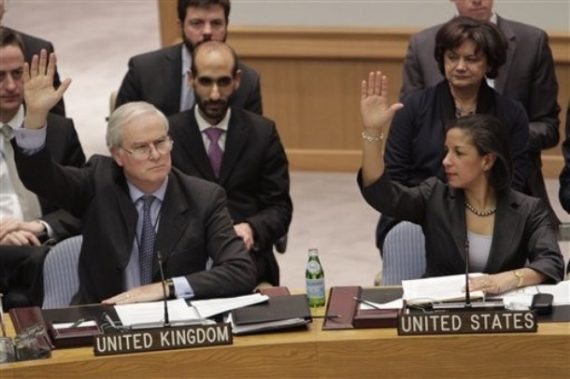

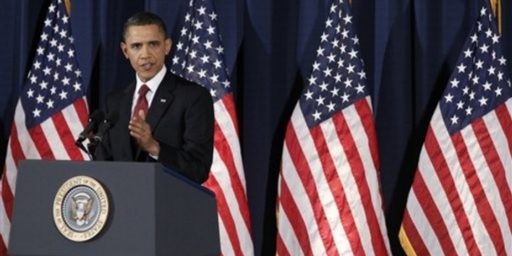
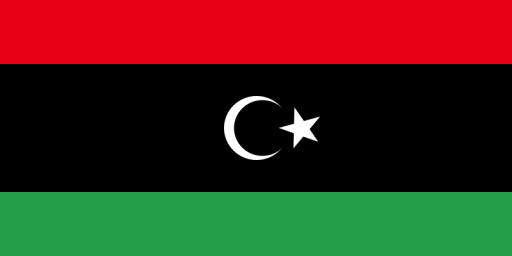

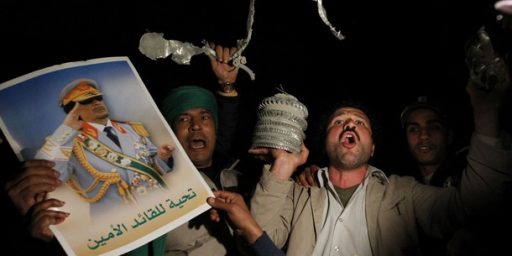
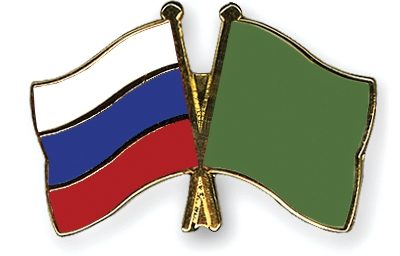
James, my money’s on Tano, Wr, Herb and Anjin claiming Cheney is behind this. Maybe it’s because of oil; or the Pentagon has new weapons to try out.
Now is the time to slash the military budget . . . right? I’m waiting for the libtards in congress to throw caterwauling hissy fits as soon as US drops the first bomb or shoots down the first Libyan aircraft.
I thought it was James who wanted to slash the military budget (and I agreed).
FWIW, I think we can only hope that there was a real diplomatic triumph here, meaning that we’ve got other countries agreeing to do the heavy lifting. I mean, if the Europeans can’t do a NFZ over Libya, why have planes?
Okay, correct me if I’m wrong but aren’t you suppose to impose your control of the skies before the ground forces are decimated?
Indecision 2011 – the world waits, acts late, has no idea what it wants to accomplish.
“Libya announces it accepts the UN resolution, encourages opening of all dialogue with all sides, according to Libyan Foreign Minister.”
Muammar isn’t quite as crazy as he pretends to be.
If you support this resolution, please respond to the concerns Joyner put in the original post. Merely cheerleading a bright, shiny new war is not a particularly thoughtful stance.
I wouldn’t pretend to understand the resolution. What matters isn’t the public part. It’s the tacit agreements between players (Arab League to supply 2 air forces?) and the opponent (now in cease fire?)
JP will Muammar actions follow his words?
There is usually a big can of worms open when the U.S. isn’t in the lead in U.N. or NATO actions. Their track record is not good. However they should be able to do a no-fly zone. Hopefully it works out but only time will tell. The big question is if it is too late. Overall besides the timing I say it is a good idea. The big part is in the execution.
Yes the War power acts give Obama the right in the short term. However just as many argue in the Bush years, it is good idea to go to congress for some sort of approval. Once done the President shouldn’t have to go back for a new resolution every time he wants to do something.
So, as I’ve asked in previous posts, what makes Libya special?
If Algeria has unrest and Bouteflika doesn’t go peacefully, are we going to establish a NFZ there? And what about Bahrain? The citizens in that country seem to be in just a dangerous position as Libyans. And after Egypt passes a new modified constitution, what do we do if a faction of the military tries to grab power? Just keep sending more and more troops into Arabic countries?
“JP will Muammar actions follow his words?”
Duh, this is the game Muammar is playing.
I suppose the rebels should now strike out and try to force Muammar into action that the UN forces can retaliate against.
BTW Wayne, I notice that you don’t recommend any actions to any other UN players. Why is that?
I’m with Sec. Gates here.
“So, as I’ve asked in previous posts, what makes Libya special?”
I don’t know, what makes the Arab League dislike Gadhafi?
His outrageous fashion sense.
James:
A lot of what you said makes very good sense. And like you I can see about nine different ways this goes wrong.
But that you carry on the laughable right wing narrative about Obama dithering while Hillary and France force his hand is disappointing.
The POTUS dithered and stalled and feuded and yet somehow, in a matter of a week or ten days, the Arab League and the UNSC and presumably the neighbors all lined up to support an open-ended, “Do whatever you want” resolution? You think this happened on France’s say-so? You think Hillary was running around Tunisia and Egypt on a rogue mission?
Please.
Yeserday, even as Doug was posting to much the same effect, claiming that nothing was likely to be done, it had already been done. And done in such a way that apparently no one saw it coming. And done in such a subtle, no-fingerprints way that the US appears to have been almost a sideline cheerleader.
How many months did it take George HW Bush to pull off something similar and we all rightly hailed that as statesmanship and high-order diplomacy.
My guess is that Hillary also worked out a deal for support from Egypt and Tunisia, possibly basing, possibly more.
James, you’ll be teaching this as an example of high-order diplomacy some day. This was genius.
Now, is it the right policy? Enh. Who knows. But drop the strife-riven, indecisive, dithering narrative, and accept that you just got schooled by Mr. Obama.
“My guess is that Hillary also worked out a deal for support from Egypt and Tunisia, possibly basing, possibly more. ”
The BBC has reported that Tunisia says it wants no involvement in what’s going on. I don’t think they are opposed as such, but I don’t see them giving basing/overflight the nod.
@Michael:
I don’t intend the piece as critical of Obama. I’ve said all along that muddling through was the best course of action. I disagree with where he’s going now; not the dithering.
I agree this doesn’t happen without Obama’s blessing. But I don’t think this was his policy objective as recently as a week ago. Otherwise, Gates, Clapper, and others should have been fired. I think Gaddafi forced his hand here and, as with Clinton in Kosovo, he let the European Allies shame him into doing something his heart wanted and his head told him wasn’t the right policy.
Further, this is classic Obama communtiy organizer tactics: Let everyone exhaust themselves getting their arguments out there and then step in and let them think they’ve reached a decision point. You’re right that the Europeans now “own” this in terms of Alliance politics. But Obama still owns it in terms of 2012.
I think this is the way Obama acts. It frustrates me because I don’t really care what the community — international or otherwise — has to say. I’d have gone for the head-shot against Gaddafi back when this started. But then, I’m a borderline sociopath and not the Leader of the Free World. (Even I’m grateful for that.)
Obama’s not a loudmouth pugilist like Bush Jr. He’s subtle. He knows how to wait. He is willing to take criticism and then to act in ways that gain him no personal glory. He’s ruthless, but in a way different from our usual interpretation of that. I think all that harms him with Americans because Americans are closer to being like me: Kill ’em or don’t kill ’em, let’s get this over with.
Obama reminds me more and more of Bush Sr., in particular the extraordinary restraint and political self-sacrifice Bush Sr. showed during the fall of communism.
I’ve used this example before. When my daughter started taking Tae Kwon Do the headmaster did what he always does with new students: he held up a hand for a high-five. Except that her hand missed his. It always does, and yet I swear I’ve never seen the man’s hand move. And he smiles a lot.
JP what exactly do you mean by recommendation of actions to any other UN players? Are you talking members other than NATO, members of the UN acting on their own or acting within the UN framework, etc. Give me some of yours as an example.
By the way have you read the news lately? Unfortunately It looks like the ceasefire was only words.
Why Libya? Libya supplies a good quantity of oil to Europe. Oil is a world market so it affects any in world that import it.
Michael, I wish you were right about Obama’s style but I don’t think you are. Most of what I see points in the opposite direction.
Although I am impress with UN resolution that came out. I wonder how much concession and price was paid to get it. Regardless the big question is what actions and outcome will come out of it. As already been showed, words are cheap. Let’s hope for the best.
YAWW (yet another war war).
Maybe Rodney wil appreciate this.
UN Security Council adopts The Macarena as its official theme song and dance.
What? This isn’t a caption contest?
Dammit Charles, now I’ll have that song in my head all day.
Dammit now I have to agree with Michael. The song is stuck in my head.
The call for is irresponsible and Hillary and by extension O are off, at a minimum Congress needs to get involved. WE installed puppet regimes in Iraq and Afghanistan and now those regimes are as bad as anything- probably the same if the Lybian rebels win- what a waste.